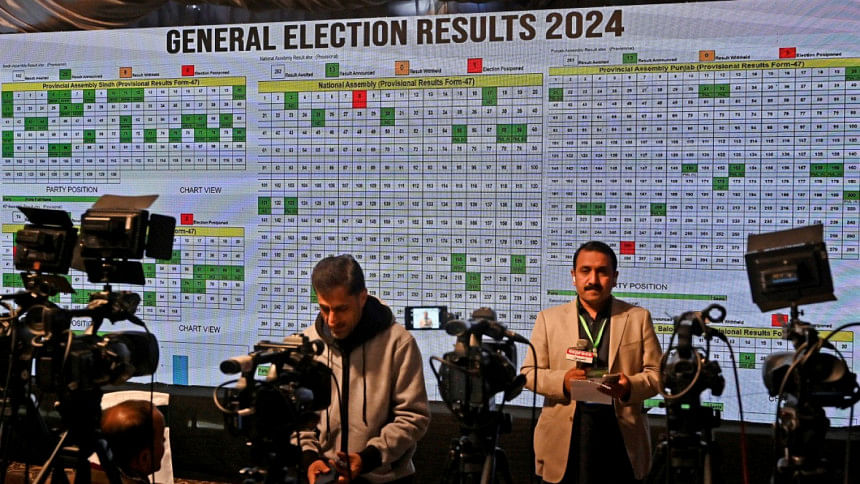With over half the seats counted, Imran's supporters lead in Pakistan polls

- Khan supporters win 49 out of 136 seats
- Nawaz Sharif's party wins in 42 seats
- Bhutto's PPP wins 34
- 28 people killed in violence on election day
Independents backed by jailed former Prime Minister Imran Khan won the most seats in Pakistan's election on Friday after results from over half the constituencies were announced, leaving political parties trailing.
Almost 24 hours have passed since the close of polls and the results have been unusually delayed, which the government ascribed to the suspension of mobile phone services - a security measure ahead of Thursday's election.
Of the 136 seats counted by 1045 GMT from 235 contested, independent candidates backed by Khan had won 49, according to a Reuters tally of results declared by the Election Commission of Pakistan (ECP).
Former Prime Minister Nawaz Sharif's Pakistan Muslim League-Nawaz (PML-N) won 42 while the Pakistan Peoples Party of Bilawal Bhutto Zardari, the son of assassinated premier Benazir Bhutto, got 34.
The rest were won by small parties and other independents.
Independent members cannot form a government on their own under Pakistan's complex election system which also includes reserved seats that will be allotted to parties based on their winnings.
But independent members have the option to join any party after the elections.
Khan is in jail and his Pakistan Tehreek-e-Insaf (PTI) party was barred from the election, so his supporters contested as independents.
Analysts have predicted there may be no clear winner, adding to the woes of a country struggling to recover from an economic crisis while it grapples with rising militant violence in a deeply polarised political environment.
"A timely announcement of the results, leading to a smooth formation of a new government will reduce policy and political uncertainty," Moody's Investors Service said. "This is crucial for the country that is facing very challenging macroeconomic conditions."
The delay in the announcement of results was unusual for elections in Pakistan. Karachi's stock index and Pakistan's sovereign bonds fell because of the uncertainty.
An "internet issue" was the reason behind the delay, Zafar Iqbal, special secretary at the ECP, said without elaborating.
The main electoral battle was expected to be between candidates backed by Khan, whose PTI won the last national election, and the PML-N of Sharif. Khan believes the powerful military is behind a crackdown to hound his party out of existence, while analysts and opponents say Sharif is being backed by the generals.
The military has dominated the nuclear-armed country either directly or indirectly in its 76 years of independence but for several years it has maintained it does not interfere in politics.
Sharif, considered by many observers to be a strong candidate, has dismissed talk of an unclear result but a close aide, Ishaq Dar, told GEO TV that the party could form a coalition with the support of independents.
"I am confident that we will form a government," Dar said.
IMF BAILOUT
If the election does not result in a clear majority for anyone, as analysts are predicting, tackling multiple challenges will be tricky - foremost being seeking a new bailout programme from the International Monetary Fund (IMF) after the current arrangement expires in three weeks.
A coalition government "would probably be unstable, weak" and "the big loser...will be the army. Because the army really has staked its reputation on its ability to deliver this vote", said Marvin Weinbaum, Director of Afghanistan and Pakistan Studies at the Middle East Institute in Washington.
The election was expected to help resolve the crises Pakistan has been dealing with but a fractured verdict "could very well be the basis for even deeper exposure to forces which would create instability", he said.
Thousands of troops were deployed on the streets and at polling stations across the country for the voting on Thursday. Borders with Iran and Afghanistan were temporarily closed as security was stepped up.
Despite the heightened security, 28 people, including two children, were killed in 56 violent incidents including bomb blasts, grenade attacks and shootings by militants, the Interior Ministry said.
"Despite a few isolated incidents, the overall situation remained under control, demonstrating the effectiveness of our security measures," Interior Minister Gohar Ejaz said.
Washington was concerned about "steps that were taken to restrict freedom of expression, specifically around internet and cellphone use," State Department deputy spokesperson Vedant Patel told reporters.
The US strongly condemned election-related violence both in the run-up to the polls and on election day, Patel added.
United Nations Secretary-General Antonio Guterres also expressed concern about the violence and the suspension of mobile communications services, his spokesperson said in an e-mailed statement.
Amnesty International called the suspension of mobile services "a blunt attack on the rights to freedom of expression and peaceful assembly".

 For all latest news, follow The Daily Star's Google News channel.
For all latest news, follow The Daily Star's Google News channel. 



Comments